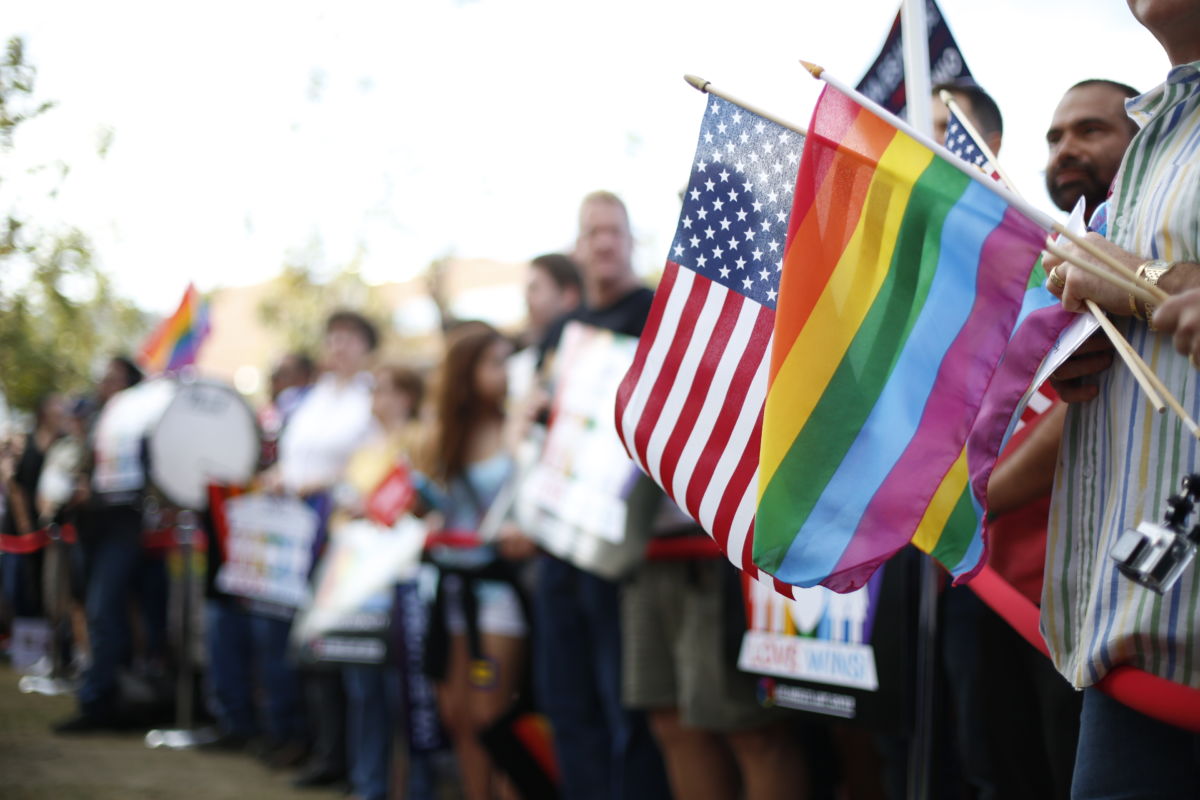The Supreme Court on Friday considered taking three cases that could determine whether an employer can legally discriminate against employees for being LGBTQ. If the Court agrees to hear some, or all, of the petitions, it will be testing both the strength of employment discrimination law under Title VII and retired Supreme Court Justice Anthony Kennedy’s LGBTQ rights legacy.
Two cases, with two different outcomes in the lower courts, present the Court with the question of whether the Title VII of the Civil Rights Act of 1964 prohibitions on discrimination “because of sex” include discrimination on the basis of a person’s sexual orientation. In Altitude Express Inc. v. Zarda, the US Court of Appeals for the Second Circuit held that Title VII does protect an employee from being fired because they are gay. In that case, Donald Zarda, a skydiving instructor, sued Altitude Express, claiming the company fired him for being gay and failing to conform to the “macho” male sex stereotypes of his co-workers. Altitude Express wants the Supreme Court to reverse the Second Circuit.
The second case involves Gerald Bostock, who alleges he was fired from his job as a child welfare services coordinator for a Georgia county’s juvenile court system after his employer found out he is gay. In May, a three-judge panel from the US Court of Appeals for the Eleventh Circuit ruled in an unpublished per curium decision that Bostock couldn’t sue his employer, because Title VII doesn’t ban discrimination based on sexual orientation. Bostock wants the Supreme Court to reverse the Eleventh Circuit.
The Supreme Court has previously avoided answering this question, declining in December 2017 to take the case of Jameka Evans, a Georgia security guard who claimed she was harassed at work and forced to quit her job because she is a lesbian. The Eleventh Circuit ruled against Evans, creating a split with the Seventh Circuit Court of Appeals, which had previously ruled Title VII covered such claims. Evans unsuccessfully asked the Supreme Court to step in.
This time, the Court has re-listed both Bostock and Zarda for consideration together — a signal the justices are giving the question a serious second look.
The Court is also considering a third case that presents a parallel question: Does Title VII apply to claims of discrimination based on gender identity and transgender status? In R.G & G.R. Harris Funeral Homes Inc v. Equal Employment Opportunity Commission, the Sixth Circuit Court of Appeals ruled on behalf of Aimee Stephens, a Michigan funeral director who was fired once she began transitioning at work.
“It is analytically impossible to fire an employee based on that employee’s status as a transgender person without being motivated, at least in part, by the employee’s sex,” the Sixth Circuit opinion states. “Discrimination ‘because of sex’ inherently includes discrimination against employees because of a change in their sex.”
The Trump administration has, not surprisingly, sided with the employers in these cases, which has further clouded the legal waters around the scope of Title VII. First, in Zarda, the Justice Department reversed course from the Obama administration’s previous action and argued to the Second Circuit Court of Appeals that Title VII does not bar sexual orientation discrimination. Then, in October 2017, then-Attorney General Jeff Sessions issued a memorandum stating that Title VII’s prohibition on sex discrimination “encompasses discrimination between men and women but does not encompass discrimination based on gender identity per se.”
The administration is making those same arguments to the Supreme Court now in Harris Funeral Homes, where it is a party. “The court of appeals misread the statute and this Court’s decisions that Title VII encompasses discrimination on the basis of gender identity,” Solicitor General Noel Francisco wrote in the government’s brief.
But while that’s the position of the Trump administration, it has also asked the Supreme Court not take up the Harris Funeral Homes case until it decides what, if anything, to do with the Zarda and Bostock cases and urges review of those decisions first. If the Court does so, it is almost certain that the government will make similar arguments.
It’s a request that could have far-reaching consequences for LGBTQ employees. Thanks in part to the Obama administration’s steps toward recognizing sexual orientation discrimination under federal law, the federal courts had largely moved away from earlier decisions that found such claims not to be covered. But that dramatically changed with the Trump administration. Since coming to power, the administration has not just repeatedly argued against LGTBQ discrimination protections, it has affirmatively attacked the rights and status of transgender people as well — as recently as November, it asked the Supreme Court to intervene in the challenges to its failed transgender military ban.
Currently 26 states do not expressly prohibit sexual orientation or gender identity discrimination in employment. Should the Supreme Court determine federal law does not protect LGBTQ employees, that would leave workers in those states even more vulnerable to on-the-job discrimination. And with a decidedly more conservative Justice Brett Kavanaugh replacing Anthony Kennedy, the former swing vote on LGBTQ rights cases, a 5-4 ruling allowing businesses to discriminate is a very real possibility.
The Court could decide as early as Monday if it will take any or all of the cases. If it does, it would hear arguments in early spring, with a decision likely in June.
Join us in defending the truth before it’s too late
The future of independent journalism is uncertain, and the consequences of losing it are too grave to ignore. To ensure Truthout remains safe, strong, and free, we need to raise $24,000 by the end of today. Every dollar raised goes directly toward the costs of producing news you can trust.
Please give what you can — because by supporting us with a tax-deductible donation, you’re not just preserving a source of news, you’re helping to safeguard what’s left of our democracy.
